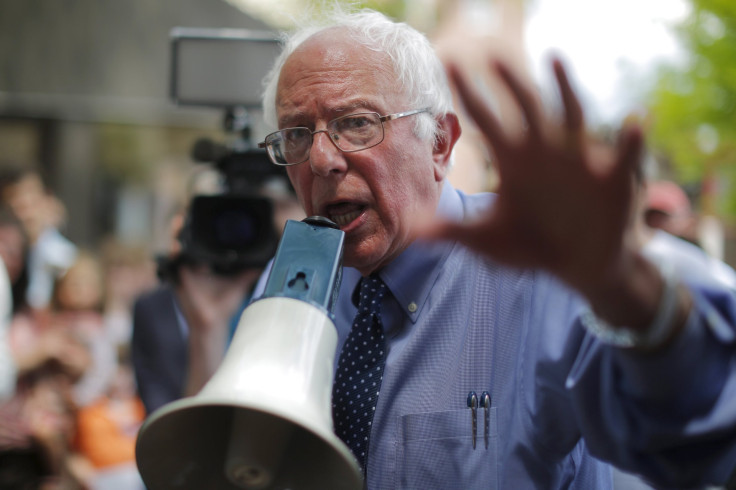Bernie Sanders 2016: Young Americans Say They Support Socialism, But Do They Know What It Is?

Trey Rittersbach doesn’t know Bernie Sanders, but he knows what socialism is – kind of.
“It’s redistributing the wealth,” the 19-year-old New York University sophomore said Thursday from a bench in Washington Square Park, then paused to reconsider. “I guess that might be more Communism.”
Rittersbach, a Ralph Nader fan with Republican leanings, tried again: “It’s acting to benefit the greater good over personal gain. Capitalism is more personal gain over the greater good.”
He’s right – kind of – and falls squarely in the middle of an emerging political trend among millennials. Poll data indicates young Americans are warming to socialism in the run-up to the 2016 presidential election, but many can’t identify what exactly the term means. Experts suggest millennials don’t have the background on socialism that other generations do, and aren't wedded to specific political labels. All of this means Sanders, a self-described socialist and long-shot Democratic presidential candidate, probably won’t benefit from their support.
Socialism, defined by Merriam-Webster as "a way of organizing a society in which major industries are owned and controlled by the government rather than by individual people and companies," varies in popularity depending on who you’re talking to.
A May poll from YouGov showed that overall, 52 percent of Americans viewed capitalism favorably, but only half of that viewed socialism favorably. Among young respondents, that difference shrunk: 39 percent saw capitalism favorably, and 36 percent saw socialism favorably. As respondents' ages increased, so did the gap, with 59 percent of people 65 and over saying they liked capitalism and 15 percent saying they liked socialism.
Socialism means different things to different generations, said Michelle Diggles, a senior political analyst at liberal think tank Third Way in Washington, D.C. This is due in part to older Americans’ experiences after World War II.
"For older people, socialism is associated with Communism and the Soviet Union and the Cold War," she said. "But the oldest millennials were 8 years old when the Berlin Wall fell. They have never known a world where the Soviet Union exists ... The connotations associated with the word 'socialism' just don't exist with millennials."
Young people view socialism not as Stalin-ism or totalitarianism, but as a movement that promotes interconnectedness, Diggles said. This is likely a side effect of a digital upbringing where they've learned to share everything on social media.
Because they don’t have the Cold War history their parents and grandparents do, millennials don't see it necessary to trade off between capitalism or socialism going forward. It’s not one or the other. "Millennials say, well, I can have both ideas in my head at the same time," Diggles added.
Aaron Messing, a 25-year-old musician from Chicago, said he both liked socialism and Sanders because they tackle problems like income inequality. Messing said it was a shame Sanders wasn't more well-known among young people because the U.S. could benefit from some of his ideas. Socialism is "awesome," he said, adding "I wish it worked."
Democrat Adrianna Scuderi, a 25-year-old butcher in Chelsea Market, said she liked capitalism because “it sets up a lot of opportunities” for advancement. She’s not totally opposed to socialism, though, because “everyone is focused on the group and equal benefits.”
Young people’s inability to define socialism shows they don’t understand it, said Emily Ekins, a research fellow at the Washington, D.C.-based Cato Institute. Their opinions change depending on the words used to describe the movement.
Survey data backed this up. Only 16 percent of millennials could define the term in a 2010 CBS/New York Times poll, compared to nearly a third of Americans over 30. In a separate poll conducted by Reason-Rupe in July 2014, 64 percent of millennials said a free market system was best for the U.S. Only 32 percent wanted a government-managed economy.
"They don't want the government to run Amazon, to run Google, to run Facebook or Uber,” Ekins said. “They just like the idea of a social safety net.”
Independent Maia Rosser, a 35-year-old DJ in New York, said she likes socialist policies but hadn't heard of Sanders. She said she supported socialist ideas because the world's shift toward capitalism has turned the global the economy into a rat race. Rosser isn't sure who she'll vote for in 2016. "I believe it takes a variety of systems to make this world work," Rosser said.
Young people's ficklness toward political ideologies means Sanders, an independent senator from Vermont, can’t rely on his Democratic socialist roots too heavily. Sanders' ideals, though they could appeal to millennials, probably won't be enough to drive them to vote in the Democratic caucus and primary.
Ekins said Sanders was better off promoting his plans to give students free tuition and curb crony capitalism. Socialism won't motivate young voters to the polls, she added. "If you don't know what the word means, how can you have a strong response to it?" Ekins said.
© Copyright IBTimes 2024. All rights reserved.





















